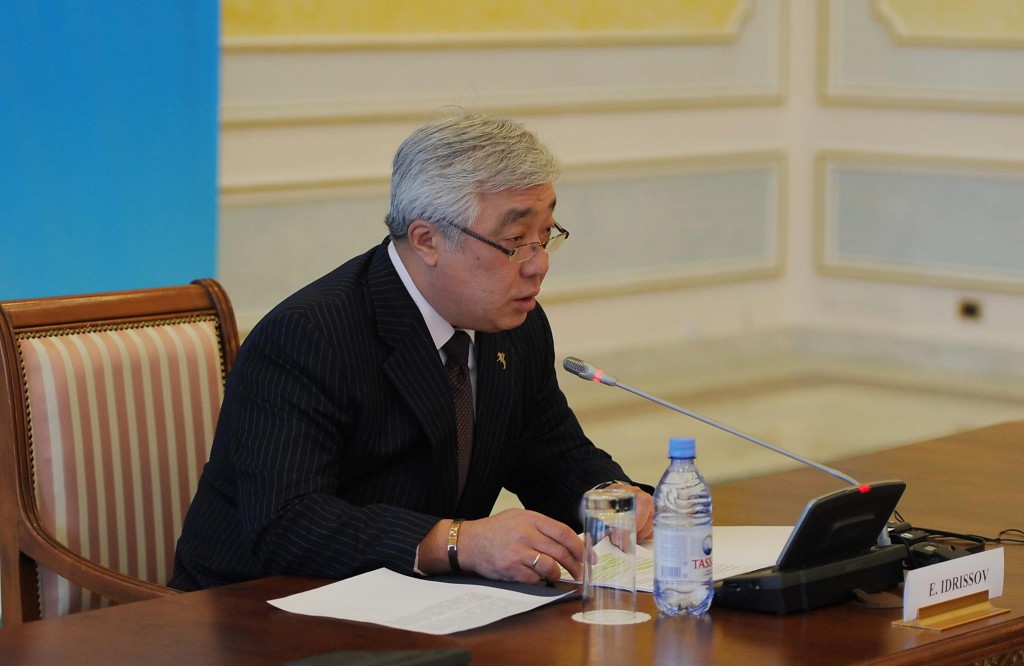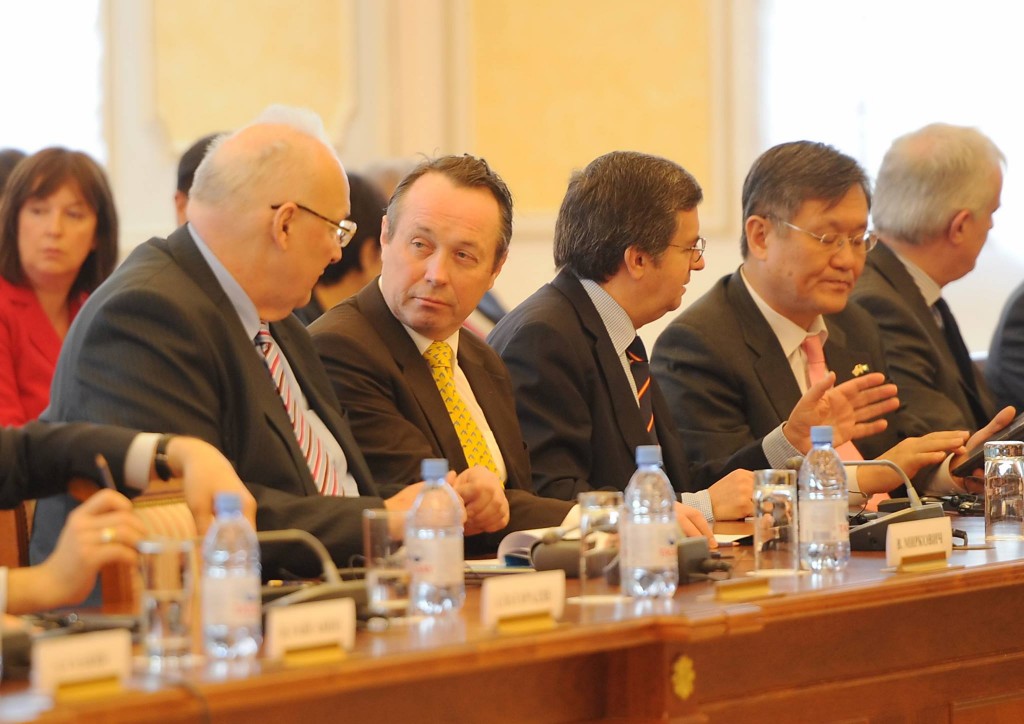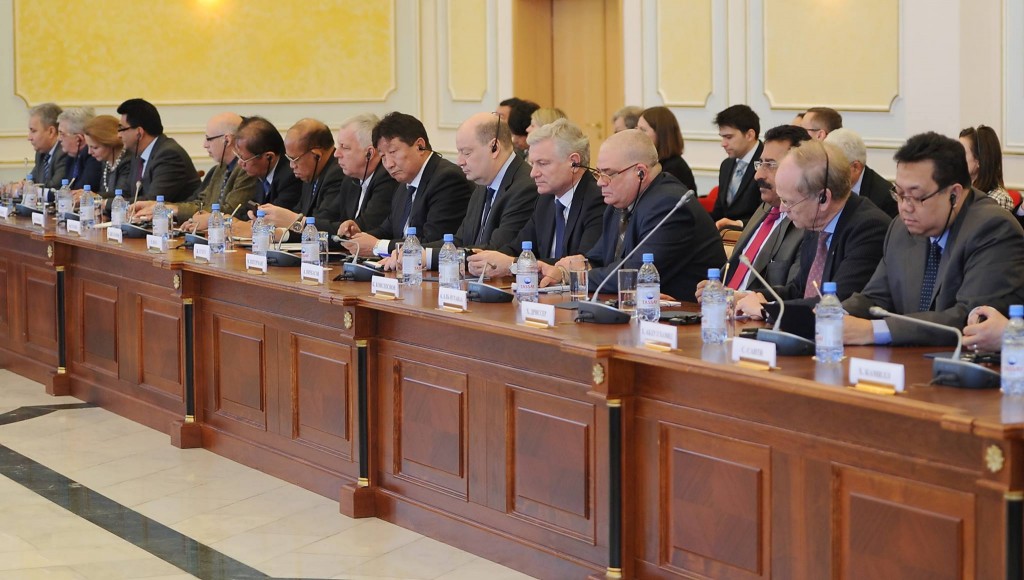ASTANA – Foreign Minister of Kazakhstan Erlan Idrissov briefed the heads of foreign diplomatic missions accredited in the country on Feb. 27 on the upcoming presidential election stressing the country’s commitment to conducting a free and fair election.
 “We are talking about the growing pressure from economic challenges such as the decline in oil prices, the impact of sanctions on Russia, instability in the region due to the Ukrainian crisis and the withdrawal of international forces from Afghanistan. Our country, as well as the entire region, is going through a period of trials,” Idrissov said, highlighting the economic and political reasons of holding an early presidential vote: that it would give the President a new mandate to pursue anti-crisis policies.
“We are talking about the growing pressure from economic challenges such as the decline in oil prices, the impact of sanctions on Russia, instability in the region due to the Ukrainian crisis and the withdrawal of international forces from Afghanistan. Our country, as well as the entire region, is going through a period of trials,” Idrissov said, highlighting the economic and political reasons of holding an early presidential vote: that it would give the President a new mandate to pursue anti-crisis policies.
“The implementation of the programme proposed by the President, Nurly Zhol, as well as long-term priorities such as the Kazakhstan 2050 Strategy and joining the 30 most developed economies in the world, require hard work and a clear focus on priorities. The government should make consistent, efficient and often strong-willed decisions,” Idrissov stated. He underlined that the new mandate would allow Kazakhstan’s leadership to begin early implementation of the objectives and to work persistently to overcome the negative impact of external factors and improve the living standards of the population.
 Referring to the organisational aspects of the presidential election, the minister emphasised that Kazakhstan will take all possible measures to ensure that the highest democratic standards are applied in the electoral process.
Referring to the organisational aspects of the presidential election, the minister emphasised that Kazakhstan will take all possible measures to ensure that the highest democratic standards are applied in the electoral process.
“I am confident that the Central Election Commission of Kazakhstan will provide a high level of organisation of the election, taking into account previous recommendations of the OSCE [Organisation for Security and Cooperation in Europe] and other international organisations, while other interested agencies will pay maximum attention to the implementation of measures required under the legislation of Kazakhstan,” he said.
Earlier, answering reporters’ questions, the foreign minister said that an early presidential election would strengthen Kazakhstan’s relations with foreign countries and reaffirm Kazakhstan’s commitment to the principles of openness, transparency, fairness and competitiveness in the electoral process.“If [an election] takes place, we as the diplomatic service will immediately start working with international organisations, primarily the OSCE, to establish an open and transparent process of election monitoring by the international community,” he added.
 At the Feb. 27 briefing, Idrissov announced that the Foreign Ministry would invite international organisations, foreign observers and media representatives to observe the election. They will be participating in all stages of the vote, receiving information on election campaign processes, informing members of the election commission about any violations of the rules and making recommendations and public statements.
At the Feb. 27 briefing, Idrissov announced that the Foreign Ministry would invite international organisations, foreign observers and media representatives to observe the election. They will be participating in all stages of the vote, receiving information on election campaign processes, informing members of the election commission about any violations of the rules and making recommendations and public statements.
The initiative to hold the presidential election one year early was put forward by the Assembly of the People of Kazakhstan (APK), a constitutional body representing the country’s numerous ethnic groups. The assembly’s statement on Feb. 14, which referred to “numerous appeals of citizens,” called for an election to give the President “a new mandate” to implement the economic stimulus programme to counter the global economic challenges affecting Kazakhstan. The initiative found support from both chambers of parliament, and on Feb. 25 a presidential decree on holding an election on April 26 was approved.
The nomination of candidates for president will begin on Feb. 26 and end on March 15, with the registration of candidates closing on March 25. The pre-election campaign of candidates for president will begin on March 26 and end at midnight on April 24.
Voting will take place on April 26 from 7 a.m. to 8 p.m., local time.
The Central Election Commission will determine the results of the presidential election and issue the corresponding decision no later than May 3.
